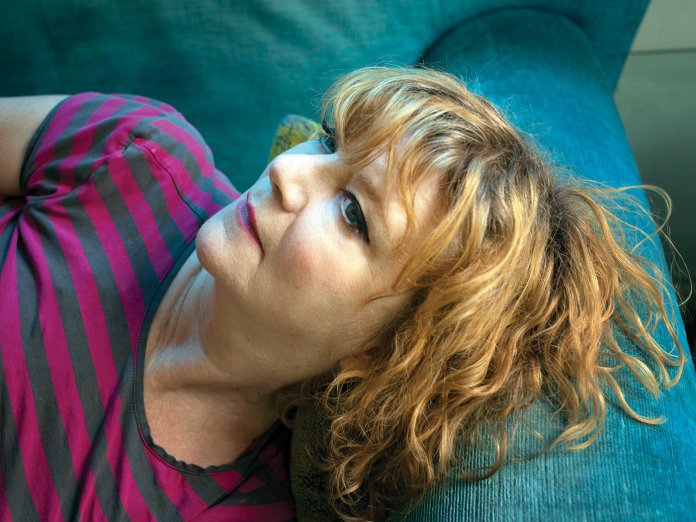In September 2021, Third Man toasted the opening of their new London store by releasing Gina Birch’s “Feminist Song” as a 7-inch single. The track marked the belated arrival of Birch as a solo recording artist, 40-plus years since she first started making music. It also set into motion a debut...
In September 2021, Third Man toasted the opening of their new London store by releasing Gina Birch’s “Feminist Song” as a 7-inch single. The track marked the belated arrival of Birch as a solo recording artist, 40-plus years since she first started making music. It also set into motion a debut album, I Play My Bass Loud, that’s so thoroughly compelling it makes you wish she’d got around to it a little sooner.
But then Birch has never been one to follow convention. Forged in the radical spirit of ’77, she brought an art-school sensibility to the post-punk adventurism of The Raincoats, the all-female band she co-founded with fellow Hornsey College student Ana da Silva. By the late ’80s – having made three albums that left an enduring impression on a new generation of feminist-leaning artists, from Bikini Kill to Sleater-Kinney – Birch was studying film and emerging as a video director. Factor in various Raincoats reunions, other musical collaborations and her flourishing painting career and it’s a wonder she’s found time for solo work at all.
As its title suggests, I Play My Bass Loud is a resolute assertion of self, doubling as a wider exploration of identity. It carries the same maverick imprint as everything Birch has previously put her name to, making for songs that feel deeply personal and often disarmingly candid: mouthy, vulnerable, wrathful, funny and plenty more besides.
Co-produced with Youth, the album features a number of star turns. Thurston Moore adds waspish guitar on a couple of occasions, Ana da Silva brings a dash of invention, Helen McCookerybook offers spiky vocal counterpoints, while Youth himself gets busy on guitar and his customary bass.
Raw minimalism is key here. Announcing itself with a blaring siren, the formidable title track maps out the terrain of these mostly spare, rhythmic songs that cut a path between dub, art-punk and experimental pop. “I play my bass loud / I turn it louder / I raise my window high / I yell across the street”, sings Birch, in an act of joyous self-advocacy. She’s joined by no less than four other female bassists, among them fellow post-punks Shanne Bradley (co-founder of The Nips) and The Mo-dettes’ Jane Crockford.
The aforementioned “Feminist Song” is a measured rallying cry that’s all the more powerful for its restraint. Over gentle keyboards and da Silva’s analogue synth, Birch quietly seethes through the spoken verses, before exploding into the chorus: “I’m a city girl / I’m a warrior / The city made me this way / I’m a drunkard, I’m political / I’m contagious, I’m analytical”. A similar sentiment fuels “I Am Rage” and the fabulously dubby “Pussy Riot” (along with “Feminist Song”, another Raincoats live favourite of recent years). Barbed with declamatory vocals, it’s ostensibly a defiant salute to the titular Russian guerrilla artists, but at its core lies a sobering reminder that the right to freedom is not a given but a constant struggle – one that requires us, as Birch maintains, “to fight for those who are still in chains”.
By contrast, Birch injects some levity with “I Will Never Wear Stilettos”. The song is a playful rejection of heels – “Give me brothel creepers / Give me Doc Martens / Give me shiny red lace-up shoes” – that addresses deeper themes of identity and gender stereotypes beneath. Birch’s humour is also much in evidence on “Big Mouth”, on which she admits to blabbing out a secret that someone had told her in confidence. It’s a habit she needs to address, she concludes.
One of the album’s most affecting moments is the intimate “And Then It Happened”. Against Michael Rendall’s bare electronic pulse, Birch’s voice is at its most confessional on what she calls “a letter to myself”. The implication is that she’s survived some kind of personal and creative crisis, at its worst profound enough to nearly break her. “I just stopped trying / Almost stopped caring”, she says in a semi-whisper, before things take an upward turn: “And then it happened / Swept along on a breeze / Swept up by the wind”.
As the piece segues into the melodious noise-rock of “Wish I Was You” (powered by three-way guitars from Birch, Moore and Youth), she’s utterly transformed, ditching old insecurities and instead finding self-acceptance: “Time has carried me forward / Now I’m happy with me”. It’s a telling moment – and on this evidence, enough to suggest that Birch, now into her late sixties, might just be entering her next great creative phase.



